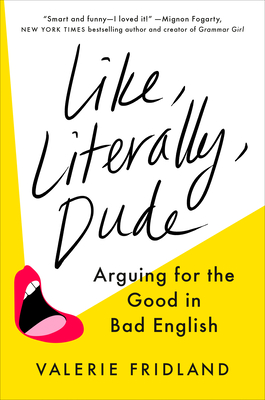Subscribe to Read
Sign up today to enjoy a complimentary trial and begin exploring the world of books! You have the freedom to cancel at your convenience.
Like, Literally, Dude: Arguing for the Good in Bad English
| Title | Like, Literally, Dude: Arguing for the Good in Bad English |
| Writer | |
| Date | 2025-04-19 17:12:17 |
| Type | |
| Link | Listen Read |
Desciption
"Smart and funny--I loved it!" --Mignon Fogarty, author of New York Times bestseller Grammar Girl's Quick and Dirty Tips for Better Writing A lively linguistic exploration of the speech habits we love to hate--and why our "like"s and "literally"s actually make us better communicatorsParanoid about the "ums" and "uhs" that pepper your presentations? Concerned that people notice your vocal fry? Bewildered by "hella" or the meteoric rise of "so"? What if these features of our speech weren't a sign of cultural and linguistic degeneration, but rather, some of the most dynamic and revolutionary tools at our disposal?In Like, Literally, Dude, linguist Valerie Fridland shows how we can re-imagine these forms as exciting new linguistic frontiers rather than our culture's impending demise. With delightful irreverence and expertise built over two decades of research, Fridland weaves together history, psychology, science, and laugh-out-loud anecdotes to explain why we speak the way we do today, and how that impacts what our kids may be saying tomorrow. She teaches us that language is both function and fashion, and that though we often blame the young, the female, and the uneducated for its downfall, we should actually thank them for their linguistic ingenuity.By exploring the dark corners every English teacher has taught us to avoid, Like, Literally, Dude redeems our most pilloried linguistic quirks, arguing that they are fundamental to our social, professional, and romantic success--perhaps even more so than our clothing or our resumes. It explains how filled pauses benefit both speakers and listeners; how the use of "dude" can help people bond across social divides; why we're always trying to make our intensifiers ever more intense; as well as many other language tics, habits, and developments.Language change is natural, built into the language system itself, and we wouldn't be who we are without it. Like, Literally, Dude celebrates the dynamic, ongoing, and empowering evolution of language, and it will speak to anyone who talks, or listens, inspiring them to communicate dynamically and effectively in their daily lives.
Review
Lots of great information about the evolution and usage of language in here as the author dissects a handful of speaking habits in modern English that are considered undesirable (think "literally," "dude," and vocal fry). I found myself willing to get on board with her points most of the time (the more you learn about how malleable language is, the less snobby about it you become, in my experience), but I absolutely cannot agree with her conclusions on filled pauses (ums and uhs in English). She claims that listeners will pay closer attention to words uttered after those filler words are spoken because studies have shown the brains of listeners are working hard to anticipate what's to come. Sure, whatever. But she then brushes off the obvious answer to why that's happening: the listener has been given time because of the break in the fluidity of the speech. Of course the listener is using their brain - the speaker isn't doing THEIR job in finding the word fast enough. No where in this section did she hint about what that may do to the listeners' view of the credibility of the speaker. If I, as an audience member of a lecture or even the viewer of a YouTube video, have to ramp up my brain power to try to figure out what the speaker - the supposed authority figure in this scenario - is trying to drive at, I end up thinking less of them. Why am I doing their job? Shouldn't they have prepared better so they know what the hell they're talking about?Perhaps I'm more insistent about this than the average person because I've been making YouTube videos for over a decade and have worked very hard to comb those unnecessary pauses out of my speech. But you know what? People appreciate it. They comment saying they enjoy that I'm not umm-ing and uhhh-ing and wasting their precious time. Not once has anyone even alluded that the absence of them gives them less time to "think," because that's nonsense.




